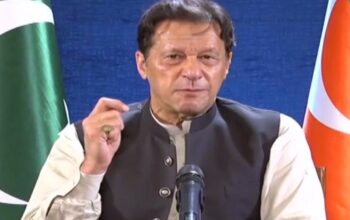By Staff Reporter
ISLAMABAD: Pakistan is set to launch a sweeping initiative in its upcoming budget to discourage cash usage and propel the nation toward a digital economy, targeting the fuel sector as its starting point, Dawn newspaper reported on Monday.
Finance Minister Muhammad Aurangzeb is expected to unveil the plan on June 10, introducing differential tax and transaction rates that favour digital payments over cash across various industries, Dawn quoted official sources familiar with the discussions.
The centerpiece of this “war on cash” will see petrol pumps nationwide, from Chaman to Khyber and Karachi to Azad Kashmir, required by law to offer digital payment options like QR codes, debit and credit cards, and mobile services alongside cash.
Government-notified fuel prices will apply solely to digital transactions, while cash purchases will incur an extra Rs2-3 per liter. “This is a regulated environment and implementable at the outset,” Dawn quoted an official as saying on condition of anonymity, as the budget remains under wraps. The official noted the policy would also aid in tracking petroleum supplies from borders to retail outlets.
The strategy adopts a dual approach, top-down and bottom-up, to shift Pakistan’s cash-heavy economy toward digital transactions. Importers and manufacturers will face a standard 18% general sales tax (GST) on digital payments, with an additional 2% GST tacked onto cash sales.
“If wholesalers, distributors, and retailers are ready to pay higher tax and their customers are willing to absorb the additional cost, it’s their choice,” the official said, highlighting the financial penalty for sticking with cash.
The Finance Bill 2025-26 will mandate all businesses, big and small, to provide both cash and digital payment options. Cash transactions will carry an additional tax or fee, while digital payments will be streamlined with cost-effective tools like QR codes, drawing inspiration from India, Indonesia, and Bangladesh, where similar measures have driven digital adoption.
Federal Board of Revenue (FBR) Chairman Rashid Mehmood Langrial, when pressed for details, said only: “We must move towards a cashless economy,” declining further comment ahead of the budget.
The budget also includes a modest tax cut for salaried workers, reducing rates by 1 to 1.5 percentage points under directives from Prime Minister Shehbaz Sharif. Sources say this signals the government’s intent to ease the burden on formal taxpayers, though fiscal limitations prevent deeper reductions. “It’s about sending a message,” one source close to the policymaking process said.
Pakistan’s reliance on cash has stymied tax collection efforts for decades, with the FBR unable to document retail businesses effectively despite repeated attempts. Past policies, like the filer and non-filer categories for banking transactions, fell short due to their narrow scope. The new initiative aims for broader reach, using a carrot-and-stick approach to capture even informal transactions.
Finance Minister Aurangzeb has been laying the groundwork, holding at least three consultative sessions with the FBR, the Ministry of Petroleum, banks, financial institutions, and consultancy firms to refine the technical and administrative details. At a pre-budget meeting last week, he pledged to “shift the tax burden away from the salaried class and the documented sector” through digitisation. At a public event the same week, he promised “bold measures” in the budget to steer the economy strategically.
The petroleum industry will be the proving ground for this shift. All petrol pumps must adopt digital payment systems, with cash sales permitted but at a premium. The policy dovetails with a bill introduced last month in the National Assembly to digitally track petroleum products from import to retail, aimed at curbing smuggling and adulteration that cost the government Rs300-500 billion annually.
“This will help track petroleum supplies and curb smuggling,” the official said, tying the budget’s dual-pricing mechanism to this legislative effort for end-to-end traceability.
Aurangzeb has cast the “war on cash” as a cornerstone of Pakistan’s economic ambitions. He has claimed the nation’s economy could be worth over $700 billion, far exceeding the current $410 billion estimate, resulting in annual tax evasion of more than Rs7 trillion. “We will ensure this documentation,” he promised earlier this year. He has also tied the push to Pakistan’s G20 aspirations, stating: “We must declare war on cash if we aspire to join the G20.”
The minister has repeatedly emphasised technology’s role, advocating for end-to-end digitisation and simplified processes to tap into the Rs9.3 trillion in cash circulation. He previously highlighted that non-filers and under-filers evade Rs1.3 trillion in taxes at the individual level, underscoring the stakes.
Copyright © 2021 Independent Pakistan | All rights reserved




